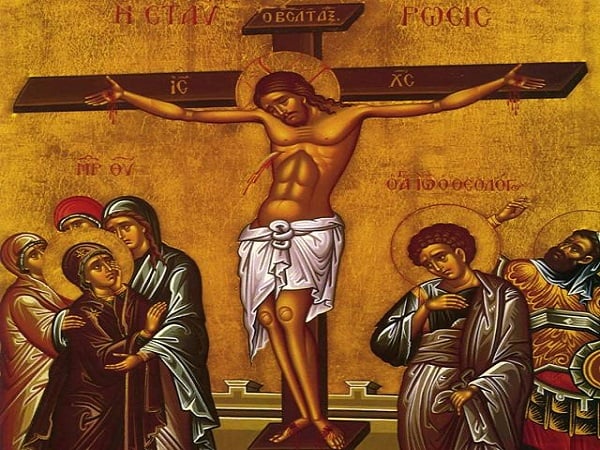The Exaltation of the Son of Man
15 September 2020‘And as Moses lifted up the serpent in the wilderness, so must the Son of man be lifted up’.
On the Sunday before the Exaltation of the Precious Cross, the Gospel reading is concerned, in the most realistic way, with eternal life. It contains a great revelation, from the Lord Himself. What He reveals is His love for humankind. God reaches out to the lost sheep, to sinful people, in order to save them by sending His Son into the world and surrendering Him to death for the sake of the human race.
Christ also refers to a foreshadowing of His own exaltation* on the Cross. In the book of Genesis, the Tree of Life is a model for the Precious and Life-Giving Cross. Then there is the Moses’ raising of the bronze serpent in the desert, as an indication of the expression of God’s mercy towards the repentant Jews. According to the account in the book of Numbers, Moses was commanded by God to make a bronze serpent, the sight of which would save those who had been bitten by the deadly snakes which lurked in the wilderness of Edom. This is the story which the Lord recalls to His nocturnal disciple Nicodemus. Saint Gregory the Theologian says that the serpent should be not be take taken as a model of Christ, but rather the opposite. The bronze serpent neutralized the poison of other snakes of the same species, saving wounded people. But when Christ was raised on the Cross, He destroyed the power of alien demons and in this way saved His own people, of the same species.

Our Lord Jesus Christ Himself used this prefiguration as an example of His own exaltation on the Cross, of His own sacrifice, which alone saves. Just as the Israelites who looked at the bronze serpent were saved, so, in the same way, those who turn to Christ in faith, boldness and courage and accept Him as their Savior and the Redeemer of the world will be saved from the mortal arrows of the anciently evil serpent, that is the devil. The wounds of sin and death are cured by the wounds of Christ, through the communion of His Body and Blood. This is confirmed for us by that preacher of the good news, the Prophet Isaiah [1].
The prophetic saying of the Lord concerning His crucifixion reveals the suffering mission and course of the Church in the world. Over time, the Church has endured the trials of suffering on all levels, but it stands and will continue to do so because it has Jesus Christ, the Lord of Life and Death, as its guide.
The moment of the greatest humiliation for Christ came when He was lifted onto the Cross, on the completion of His mission of salvation. Through the Lord’s death, death is abolished and life is given to the whole world.
God’s love for us is boundless and this is confirmed by God Himself, Who sent His only-begotten Son to suffer the cross and death because we are exceptional, the most perfect of His creations. So God didn’t send His Son to judge the world, but to save it. This occurred during His first coming into the world, when He walked in Jerusalem and called people to repentance.
Saint John Chrysostom stresses that we must be aware of this love of God for us and realize its value. He didn’t even care about His own Son for our sake, whereas we’re concerned about the money we have. He gave His Son for us, but we aren’t prepared spurn material concerns for His sake.
The Lord tells us that those who believe in Him will in no way be lost, but will be given eternal life by our merciful God. He emphasizes this because He wants to show us that God’s mercy and love for us aren’t enough; our faith is also necessary. Faith is the basic requirement for salvation and is the only means by which we can manage our progress towards Jesus Christ.
Let us turn our eyes to Jesus Christ, our sole Benefactor, the Savior and Redeemer of the world, Who gives us His Body and Blood for our food and drink at every liturgy, as an elixir of immortality and an antidote to mortality, according to Saint Ignatius the God-Bearer. Let us avoid sin and, in particular, avoid condemnation of other people. If Christ, Who came into the world, refused to judge it, who are we to do so? We have no right to judge and condemn other people in His name, either. We’re prone to acting as prosecutors and judges for everybody else, though not for ourselves. We should realize that, in doing so, we’re denying Christ. Our presence as Christians in the world is redemptive, provided it’s an extension of the life of Christ. It’s up to us whether we’re prepared to turn to Christ, leaving sin behind us and gazing upon His Precious and Life-Giving Cross.






